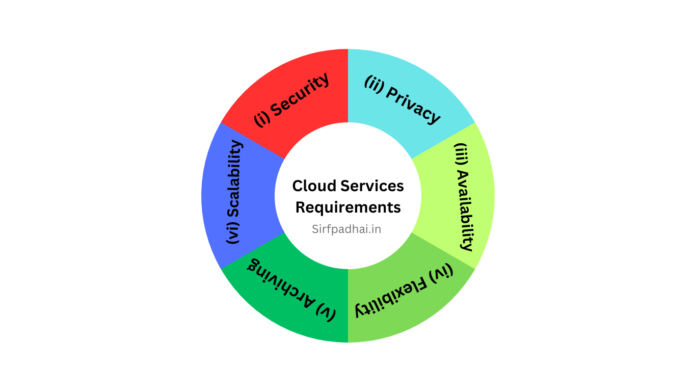Explain the different cloud service requirements.
Major cloud services requirements are as follows –
(i) Security –
The resource pooling characteristics of computing permit users to dynamically share physical and virtual resources High-security concerns are usually associated with virtual environments which include virtual components like hypervisors for running virtual machines and virtual environments for virtual machine communications. An organization that contains its own IT components on its premises can apply and monitor proper security policies and controls, especially for identity management. As a result, it is a priority to choose a cloud service that supports suitable and adequate access control and authentication mechanisms.
(ii) Privacy –
Organizations are often uncertain when it comes to managing and storing sensitive information in the cloud. Privacy is an important issue to be addressed in the direction of raising users’ trust in the cloud computing paradigm. The geographic location of data stored in a cloud environment is usually not revealed to users. This lack of transparency raises high concerns especially since privacy regulations and policies differ from one country to another.
(iii) Availability –
Most organizations need maximum availability levels of their computing resources provided by cloud services. Cloud services have recently experienced failures resulting from several factors including security attacks, natural disasters, and infrastructure outages. Cloud computing environments need to make serious provisions to react quickly and efficiently to such outages and ensure the continuity of cloud services. Thus, the ability to efficiently and seamlessly recover from outages is an important factor to consider when comparing cloud services.
(iv) Flexibility –
Cloud computing service providers should be able to offer flexible plans and services that allow an enterprise to quickly and efficiently adapt to changes in their goals, customer demands, and global changes.
(v) Archiving –
Archiving provides long-term storage of data that is no longer momentarily needed keeping archived data imposes high storage demands and also require additional backup and restore feature for the consumers. It may also impose some additional costs on the services. Hence, a cloud computing service with an archiving feature and easy access to archived data is among the essential requirements for many organizations.
(vi) Scalability –
Cloud scalability is one of the most important factors in providing successful cloud services. It is mainly enabled by increasing the capacity and number of IT resources.
Discuss cloud service management in brief.
OR
How cloud services are managed? Explain in detail.
The control, visibility, and automation required for efficient cloud delivery are provided by a service management system in both public and private implementations –
(i) Make Easier User Interaction with IT-
(a) User-friendly self-service interface accelerates time to value
(b) Service catalouge allows standards that drive consistent service delivery.
(ii) Allow Policies to Lower Cost with Provisioning –
(a) Reuse and release of assets are allowed by provisioning policies.
(b) Service delivery is increased by automated provisioning and de-provisioning.
(iii) Increase System Administrator Productivity –
Move from management silos to a service management system. The development of cloud deployments is prompting enterprises to either look to third-party cloud brokers or assemble in-house teams to manage specialized cloud service providers mainly because of the following reasons –
(i) A mechanism is required by every service-oriented approach to permit discovery and end-point resolution.
(ii) Cloud services delivered across firewalls require a third party that is used as a service broker.
(iii) Registry or repository technology offers this where service delivery is within the firewall.
In cloud computing, leveraging service brokers will possibly become a crucial success factor because cloud services multiply and expand faster as compared to the ability of cloud consumers to manage or control them. To utilize services in a reliable way, the growth of service brokerage businesses will increase the ability of cloud consumers. Cloud service providers are expected to start to partner with cloud brokerages to make sure that they can deliver the services they develop. These cloud intermediaries will support companies in selecting the right platform, deploying apps across different clouds, and perhaps even give cloud arbitrage services that enable end users to shift between platforms to get the best pricing.








